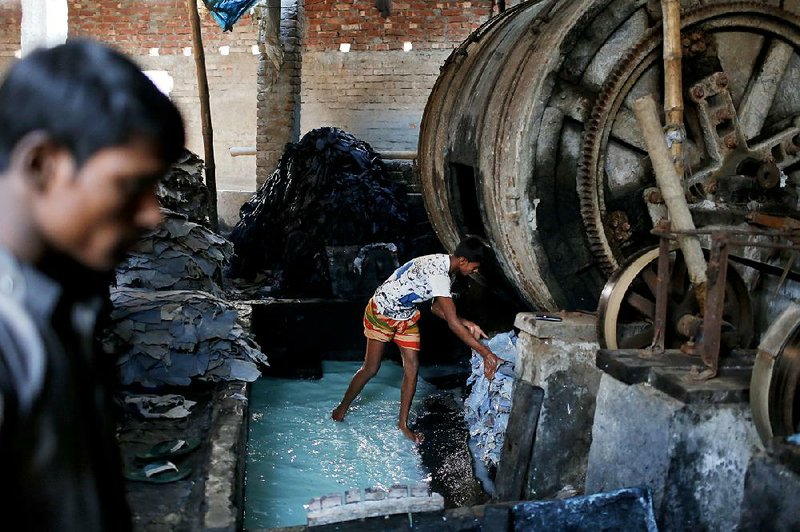DHAKA, Bangladesh -- Hazardous, heavily polluting tanneries, with workers as young as 14, supplied leather to companies that make shoes and handbags for a host of Western brands, a nonprofit group that investigates supply chains says.
The report by New York-based Transparentem, released Friday to The Associated Press, didn't say leather from the tanneries ends up in American and European companies' products, only that the manufacturers of some of those goods receive it.
Some companies say they're certain the leather used to make their products was imported from outside Bangladesh, and the manufacturers concur. Still, in response to the report, most brands switched factories, banned Bangladesh leather or demanded improvements and audits.
The alleged abuses have long plagued Hazaribagh, a Dhaka neighborhood that, with more than 150 tanneries, is the hub of Bangladesh's leather industry. The air is thick with an eye-stinging, rotten-egg odor, and children play on small hills of rotting hide trimmings. The Buriganga River, a source of drinking water for 180,000 people, shimmers with poisons from tannery chemical runoff, as well as other human and industrial waste.
The $1 billion-a-year industry was ordered to shut down and move more than 15 years ago, but deadlines have passed without consequence and fines have gone unpaid. Last week, Bangladesh's High Court told authorities to stop supplying gas, water and electricity to the tanneries. Rawhide supplies have also been ordered halted.
And yet they're still in business, fueled by consumer demand for ever-more-stylish but low-priced wallets and boots.
Transparentem uses investigative journalism practices to track labor and environmental abuses, producing reports that are privately shared with companies involved. The group gives companies time to respond before sharing its findings with investors, regulators, advocacy organizations or journalists.
Its confidential Hazaribagh report and accompanying video, shared late last year with about a dozen U.S. and European brands and companies, showed workers at five different tanneries bent double under the weight of soaking wet cow hides, shuffling past heavy machinery delivering heavy loads. Workers are seen whipping hand-held razors through leather, tossing off loose trimmings. Barrels of chemicals lean against walls. The floor is wet, and some workers are barefoot.
Bangladesh law prohibits workers under 18, but some appeared to be teenagers. The report says that in 2015, a mother confirmed her child working in a tannery was 14. Footage from 2016 showed the child was still working there. On the video, a 17-year-old told the videographer his age. And there's 2016 footage of two workers agreeing that there are 15-year-olds on-site.
Transparentem did not publish its findings but showed the video to an AP reporter before sharing the report. It said the discretion was needed to protect its investigators and the workers and that the research is ongoing.
The nonprofit said its Hazaribagh team tracked leather first-hand and with corporate reports from two tanneries, Apex Tannery Ltd. and Bay Tanneries Ltd., to Bangladesh shoemakers Apex Footwear and Bay Footwear. Apex Tannery also sent leather to South Korean leather dealer White Industries, according to the report. From White, Transparentem tracked leather to Simone Accessories, a South Korean handbag-maker.
Using customs records and business documents, the nonprofit found that those factories make shoes and purses for Clarks, Coach, Kate Spade, Macy's, Michael Kors, Sears, Steven Madden and Timberland. Also included were Germany-based Deichmann, a shoe and sportswear chain, and two U.S. firms -- Harbor Footwear Group and Genesco -- which design and market shoes in even more brands.
E. Benjamin Skinner, founder and principal of Transparentem, said the group investigates endemic problems within an industry and that it looked into Apex and Bay because they are among the largest in the leather industry.
"We tell brands and retailers what they may not, but should, know about those with whom they do business. This gives them the opportunity to use their influence with their suppliers to address questionable activity and advance positive action," Skinner said.
Syed Nasim Manzur, managing director of Apex Footwear and a director at the Apex Tannery, calls Hazaribagh "an environmental disaster" and said they'll soon close their plant there. But he said the report is a "smear campaign," that allegations of child labor are unsubstantiated, and that Hazaribagh leather doesn't end up in exported products.
Manzur said Apex Footwear and Apex Tannery are separate entities, although they have some owners in common and are associated businesses.
Bay Footwear technical adviser Rezaur Rahman, speaking for Bay Group, which includes their tannery, called Transparentem's findings "absolutely baseless."
Coach -- whose website says its products are "handcrafted from the finest American and European hides and textiles" -- said it gets no more than 1.5 percent of its leather from Hazaribagh, and Kate Spade said it gets just 1 percent. Both said they're stopping any purchases from Hazaribagh.
Michael Kors and Harbor Footwear said they were a few steps removed from the Hazaribagh tanneries, hadn't knowingly sourced leather there, and would make sure not to.
Clarks and Deichmann said they were certain that no Hazaribagh leather ended up in their products.
Information for this article was contributed by Youkyung Lee of The Associated Press.
Business on 03/25/2017
